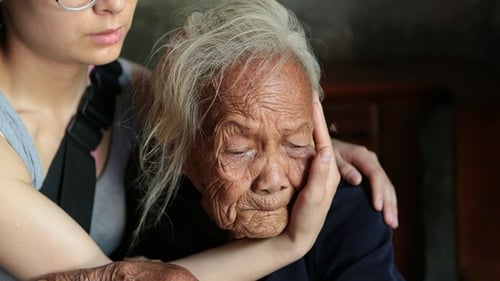JIN HAN YU (2017)
장르 : 다큐멘터리
상영시간 : 1시간 1분
연출 : Kuan Guo
시놉시스
The film records a middle-aged woman Han Mei who longs for life. In the fight against the disease, the experience makes her redefine the meaning of life...

중국 지역 일본군 ‘위안부’ 피해자 20만 명 2014년 촬영 당시 생존자 단 22명 그 22명의 할머니들이 들려주는 마지막 이야기 그리고… 2018년 8월 현재 중국에 남아 있는 ‘위안부’ 피해자는 단 6명 할머니들 대부분은 90세를 넘겨 삶의 끝자락에 서 있다.

This important, patient documentary follows a year in the life of the sidings dwellers who eke out a living, begging, foraging, stealing and sleeping rough near the Baoji railway station in Shaanxi.

The movie follows two unfortunate secret lovers who are constantly looking for a solution to their situation. Both of them are always arguing over their relationship. One day they went to a trip out of the city, into the outskirt. They hope they can solve their problems or at least escape them temporarily. They don’t have a solution, and they don’t understand why they are together. One thing that keeps them together is their love and care for each other. This is the second part of James Lee’s Love Trilogy which takes another look at unfaithfulness or rather faithlessness.

On May 12, 2008 , the biggest earthquake in Chinese history occurred in the film maker's hometown of Wenchuan. According to official polls, 69,159 were killed, 374,141 were seriously injured and 17,469 are still considered to be missing. The film maker's parents, central character in the film, are survivors. In a surreal hybrid of documentary footage, experimental abstraction and fictional elements, "On the Way to the Sea" studies the human fragility and spiritual homelessness generated by such disasters.

In 1946, Heidi is entrusted to a Swiss family by her father. He will never come back for her. Today, François Yang questions his mother about her past. What follows is a journey to China, a quest to reconstruct memory. Through contact with her brothers and sister, Heidi measures the extent of the drama experienced by her family that remained in China, persecuted by the Communist Party.

철도 위에서 3년 이상 촬영하면서 빛과 어둠, 언어와 제스처가 교차하며 변화하는 중국의 내면을 담았다. 추상회화를 연상케 하는 프레임을 통해 인간과 기계의 만남을 묘사한다. 기차의 일상과 인간을 추상적 이미지로 조형한 에세이 필름. (2015년 제16회 전주국제영화제) 리뷰 3년의 시간 동안 중국의 원근각지를 이동하는 철도의 이모저모를 편집하여 만든 에세이 다큐멘터리이다. 철로, 곤히 잠자는 사람들, 콩나물시루 같은 기차의 낭하, 좁은 통로에서 담배를 피우는 사람들은 중국 사회의 빛과 그림자를 무연히 은유한다. J. P 스니아데키 감독은 추상회화를 연상케 하는 회화적인 프레임 구성을 즐겨 사용한다. 순간순간 카메라의 존재를 드러나거나 카메라 뒤에 있는 자신을 드러내기도 한다. 육중한 철의 질감, 비곗덩어리, 핏물이 흐르는 내장 등의 오브제들을 활용하면서 그는 빈 라덴이나 카다피와 모택동을 비교하는 중국 사람들의 이야기를 슬쩍 끼워 넣음으로써 사회학과 문화인류학을 오간다. 슬금슬금 옆걸음질 치며 잠행하는 카메라는 영화의 말미에 쾌적한 상 등급 고속열차로 점핑한다. 철도, 기차의 일상, 인간을 추상적인 이미지로 조형해낸 이 에세이 필름은 사물을 응시하는 밝은 눈을 지닌 예술가의 노력에 의해 탄생했다. 2014년 「필름코멘트」가 선정한 10대 영화에 이름을 올렸다. (2015년 제16회 전주국제영화제/장병원)

Xuan is a young man working in the film industry in Beijing. To make a documentary film that he wants to present at international festivals, he decides to take advantage of the holidays of the Day of the Dead to return to Chengdu, his hometown located at the other end of the country. The documentary he is about to make is about his relationship with his own lover. He leaves for Chengdu, accompanied by another man, Bo, the cameraman of the film. The two men take the train to Chengdu where Hong, Xuan's lover, is waiting for them. From the first moment of their arrival at the station, Xuan and Bo begin to turn with their camera, Xuan having already explained to Bo what he wanted to film and that Hong would always be "playing", Bo then trusting in Xuan. But Hong is more and more opposed to this camera and the presence of Bo.

A documentary chronicling the coming of age of a young chinese man.

The relationship between two young men in Beijing becomes strained after one of them develops an unusual fetish.

Legendary Peking Opera master, Yuling Fang, emigrates to New York where he works in a nail salon. Realizing there is no one to inherit his legendary skills, he decides to mount an amateur production in order to keep alive the vanishing world he loves.

In northeastern China the Songhua River flows west from the border of Russia to the city of Harbin, where four million people depend on it as a source of water. Songhua is a portrait of the varying people that gather where the river meets the city, and an ethnographic study of the intimate ways in which they play and work.

The "Great Sichuan Earthquake" took place at 14:28 on May 12, 2008. In the days after, ordinary people salvage destroyed pig farms in the mountains, collect cheap scrapped metals, or pillaging other victims' homes. Behind the media circus of official visits is an inconsolable grief of families searching for loved ones. As the Lunar New Year approaches, vagabonds and family tell of the ill-handling of rebuilding schemes and misuse relief funds. As they prepare for another visit from a high official, the refugees are swept out of the town and into tent cities. The promise to put a roof over their heads before winter seems impossible to keep.

In China, most families have difficulties facing their lesbian, gay, bisexual and/or transgender (LGBT) children. They have to contend with common social beliefs that homosexuality is shameful, abnormal, a perverted condition caused by deviant family relationships. Many parents see their kids as their property, and fathers often assert their authority to ensure that no harm comes to the family reputation. The documentary 'Papa Rainbow' features six Chinese fathers who talk openly and freely about their experiences with their LGBT children. Speaking out against discrimination and stigma, they redefine what it means to protect a household. They fully embrace their kids for who they are, and become pioneer activists fighting for an equal and diverse society.

In this short from acclaimed queer filmmaker Fan Popo, an introverted senior school student and a transgender vintage shop-owner, two lonely souls are swimming in the fast-changing-city pool. Can they break the wall of communication? Where are they heading to?

The documentary, “JIAYI”, adopts a particular position from where it objectively and non-discriminatingly uncovers a real world of these left-behind kids in rural area in China, which overthrows the social stereotyping towards this special group existing in the remote and underdeveloped regions.

Different veterans, different memories of the Anti-Japanese War, and different lives. The oral narratives of 7 veterans show you the pictures of the Anti-Japanese War in that year, and take you to understand the current situation of the veterans of the Anti-Japanese War in Guangdong.

"If the old doesn't go, the new never comes" recites a teenager hanging out near a demolition site in the center of Chengdu, the Sichuan capital in western China. In Demolition, filmmaker J.P. Sniadecki deconstructs the transforming cityscape by befriending the migrant laborers on the site and documenting the honest, often unobserved, human interactions, yielding a wonderfully patient and revealing portrait of work and life in the shadow of progress and economic development.

New Castle is a remote rural village where houses and mountains have been distorted due to excessive mining. Under the "New Village" campaign, all the villagers will be moved into the nearly completed Luxury Buildings. The documentary depicts the life of two groups of people, miners and villagers. The miners who are from all over the country, lost their jobs because of the Olympic Games in Beijing - the mine was shut down to make the air less polluted. The villagers had no better luck. Granny Fan lost two sons and two grandsons in a mining accident. Old Han and Old Wang are still farming. Some youngsters are gambling in the house of Han Bin, who was crippled in another mining accident. In the film, you can also see the village election, the service of local Christians, and people worshipping for a better year to come.










